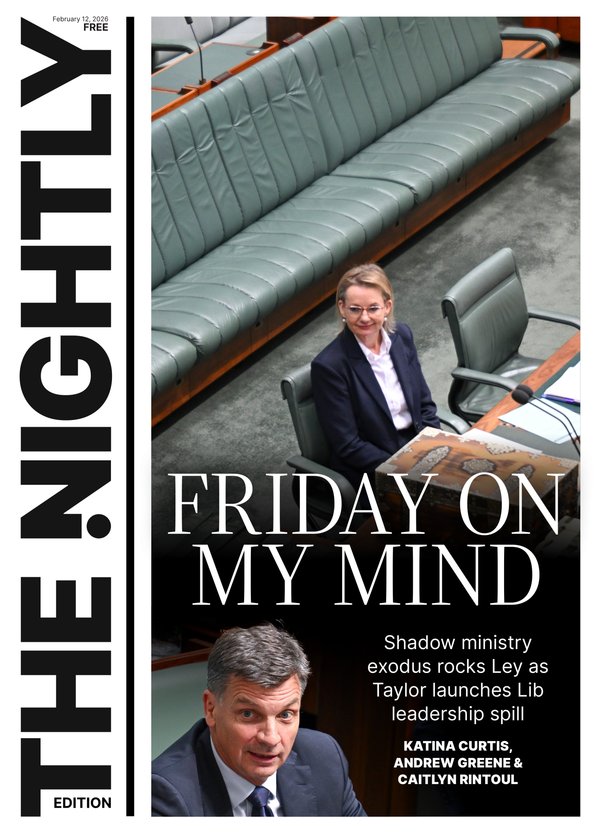Simon Birmingham: Five reality checks for a better perspective on national debate
A little more pride and a little less whinging would be a great New Year’s resolution from us all.

As many Australians embark on New Year’s resolutions, we could also do with accepting some national realities. Here are five reality checks that spring to my mind and could put a better perspective into our national debate.
Firstly, most of us do have it pretty bloody good in Australia relative to the rest of the world, so a little more pride and a little less whinging would be a great resolution from us all.
Yes, too many are doing it tough. The cost of living has spiked in the past couple of years, making every household budget feel stretched. There are big issues to tackle so as to ensure future generations get similar opportunities, especially in home ownership.
Sign up to The Nightly's newsletters.
Get the first look at the digital newspaper, curated daily stories and breaking headlines delivered to your inbox.
By continuing you agree to our Terms and Privacy Policy.But overall we still enjoy one of the best lifestyles in the world, in one of the most amazing environments, with among the highest standards of living.
The top job of the next Australian government is to preserve this, especially by stopping the recent inflationary-driven decline in real household incomes.
Reality number two is that there’s no free ride from the government. If you want governments to do more, then be prepared to pay higher taxes, otherwise you’ll just be saddling your kids with higher debts.
Every time governments get cajoled into having a royal commission, or make an election promise of one, there is a mountain of well meaning recommendations that come with overwhelming costs attached.
Quickly the media expectation is that the recommendations must all be delivered upon, yet few want to tackle the thorny issue of how they’re paid for.
A helpful resolution for governments would be no more royal commissions. My personal preference is for a consolidated period of thinking about where governments could do less, better target payments, apply more effective means testing and reduce the size of bureaucracy by also reducing red tape across our economy.
This leads me to reality check number three: we need governments to do unpopular things.
Someone is always unhappy when a government program is cut, or people are made to contribute more for their own care. Good and worthy reforms, especially tax reforms, often create winners as well as losers.
If governments always run scared from or yield to the squeals of those set to lose, then reform never happens and, ultimately, we all lose in the long run.
Maintaining our good fortune as a nation will over time require reforms to government programs, tax, regulation and industrial relations. Not everyone will be happy, but we need to collectively cop it on the chin.
Many of these reforms are necessary so that businesses make money. That’s reality check number four: we need businesses to be profitable and should celebrate not denigrate business success.
We need such success to occur in genuinely competitive markets, that drive quality higher and prices lower through innovation and productivity.
But when businesses do succeed in such an environment, even when they achieve record profits, that’s no reason to tax them more or regulate them harder.
The version of the tall poppy syndrome that demonises big business or multinational corporations may tick populist boxes, but these are the same entities we rely upon to create good paying jobs and keep driving new technological breakthroughs.
Further, when these businesses make good profits they pay more tax, all while those same profits flow into our superannuation funds to boost our retirement savings. We should be building an economy that creates more such success, not bowing to those unions or activists who relentlessly attack it.
Lastly, and speaking of not bowing to populism, Australia needs migrants. We cannot afford for a debate about better managing our migration system, better building infrastructure or better housing policies to ignite the worst of anti-immigration sentiment.
The reality is that without targeted and skilled migration the working and tax paying share of our population will shrink. Fewer people would be made to cover the costs of more, until the budget snapped and crucial social services or investments in areas such as defence could no longer be funded.
People are feeling worse off because of inflation staying higher for longer than it should, and the housing market is too tight, but blaming migration and unduly slashing migrant numbers would be damaging and detrimental.
That doesn’t mean open slather. Responsible governments must control our borders and ensure controlled migration delivers the maximum benefits it can to our nation.
From international students whose fees fund much of the research in our universities to the skilled migrants boosting innovative sectors like biotechnology, or those working jobs in regional Australia that nobody else will do, we need to better appreciate the role and economic importance of migration to our country. Good migration policies will actually grow our economy, create more jobs and ease inflationary pressures.
So, whatever your New Year’s resolutions, let’s accompany them with some reality checks for the nation too. Because facing up to reality will ultimately allow us to better hold our leaders to account for their decisions too.
Simon Birmingham is shadow foreign affairs minister
